sonnet
莎士比亚sonnet及其翻译

SONNET 106 十四行诗第106首 [英] 莎士比亚When in the chronicle of wasted time 我看到往昔年代的史书-I see descriptions of the fairest wights, 对风流人物的详尽绘述,And beauty making beautiful old rhyme 美艳成就了古老的诗赋-In praise of ladies dead, and lovely knights, 赞翩翩骑士和绝代尤物;Then in the blazon of sweet beauty's best, 那么,这些对绝色的夸耀, Of hand, of foot, of lip, of eye, of brow, 手足与朱唇、靓眸与眉毛,I see their antique pen would have express'd 依稀这表述之古风笔调-Even such a beauty as you master now. 宛然你而今的潇洒风貌。
So all their praises are but prophecies 故所有的赞词,仅在预示-Of this our time, all you prefiguring; 预述你的一切,且系此时;And, for they look'd but with divining eyes, 而他们只是以慧眼瞩视,They had not skill enough your worth to sing: 却无力去歌颂你的价值。
For we, which now behold these present days, 而我们,见到了当今时代,Have eyes to wonder, but lack tongues to praise. 不由惊艳失语,目瞪口呆。
-by William Shakespeare (1564-1616)附1]:卞之琳译本-过往世代的记载里常常见到前人把最俊俏人物描摹尽致,美貌如何使古老的诗句也美妙,配得上歌颂美女和风流骑士,看人家夸赞美貌是怎样的无比,什么手,什么脚,什么嘴,什么眼,什么眉,我总是看出来他们古雅的手笔差不多恰好表现了你的秀美。
sonnet名词解释
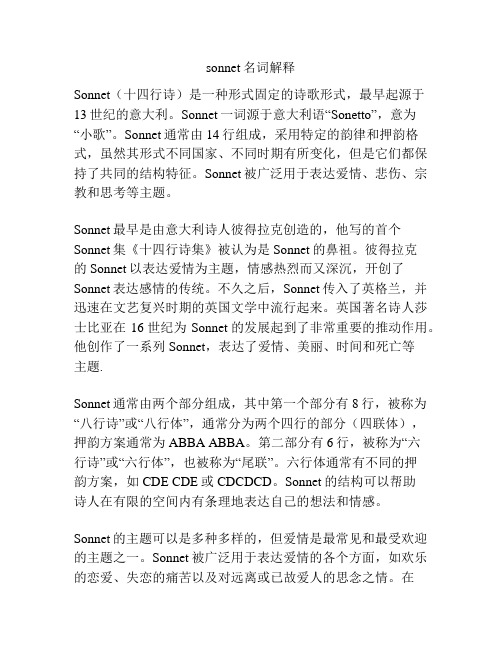
sonnet名词解释Sonnet(十四行诗)是一种形式固定的诗歌形式,最早起源于13世纪的意大利。
Sonnet一词源于意大利语“Sonetto”,意为“小歌”。
Sonnet通常由14行组成,采用特定的韵律和押韵格式,虽然其形式不同国家、不同时期有所变化,但是它们都保持了共同的结构特征。
Sonnet被广泛用于表达爱情、悲伤、宗教和思考等主题。
Sonnet最早是由意大利诗人彼得拉克创造的,他写的首个Sonnet集《十四行诗集》被认为是Sonnet的鼻祖。
彼得拉克的Sonnet以表达爱情为主题,情感热烈而又深沉,开创了Sonnet表达感情的传统。
不久之后,Sonnet传入了英格兰,并迅速在文艺复兴时期的英国文学中流行起来。
英国著名诗人莎士比亚在16世纪为Sonnet的发展起到了非常重要的推动作用。
他创作了一系列Sonnet,表达了爱情、美丽、时间和死亡等主题.Sonnet通常由两个部分组成,其中第一个部分有8行,被称为“八行诗”或“八行体”,通常分为两个四行的部分(四联体),押韵方案通常为ABBA ABBA。
第二部分有6行,被称为“六行诗”或“六行体”,也被称为“尾联”。
六行体通常有不同的押韵方案,如CDE CDE或CDCDCD。
Sonnet的结构可以帮助诗人在有限的空间内有条理地表达自己的想法和情感。
Sonnet的主题可以是多种多样的,但爱情是最常见和最受欢迎的主题之一。
Sonnet被广泛用于表达爱情的各个方面,如欢乐的恋爱、失恋的痛苦以及对远离或已故爱人的思念之情。
在Sonnet中,诗人常常使用隐喻、象征、比喻和其他修辞手法来表达其情感,使读者产生真实而深刻的共鸣。
除了爱情之外,Sonnet还被用来表达其他主题,如宗教、自然和社会等。
例如,一些Sonnet可以表达对上帝或宗教信仰的赞美和思考,另一些Sonnet可以描述自然的美丽和力量,还有一些Sonnet可以探讨社会问题,如不平等和流离失所。
总之,Sonnet是一种结构严谨、形式固定的诗歌形式,它以它独特的押韵和韵律格式,提供了一个有效的方式来表达诗人的感情和思想。
英国文学之十四行诗第十八首Sonnet

A. Iambic Monometer:And die B. Trochaic Dimeter: Rich the treasure. C. Iambic Trimeter:Theirs not to make reply.
Imagery
Imagery refers to the sensory images d by words. Imagery is the life of a good poem. Imagery is divided into visual image, auditory image, olfactory image(嗅觉), tactile image (触觉), gustatory image(味觉), kinaesthetic image (动觉), abstract image, etc.
(Anapestic Trimeter:Down to the depths of the sea)
D. Iambic Tetrameter:Row, brother, row , the stream is fast… (Trochaic Tetrameter:Life is real! Life is earnest!) (Amphibrach Tetrameter : A farmer went trotting upon his grey mare) E. Iambic Pentameter:Farewell, the tranquil mind, farewell, content!
D. Dactylic foot (Dacty1) (—∨ ∨ ) (/ ∨ ∨ ) 扬抑抑格 Slowly the mist o’er the meadow was creeping.
Sonnet 翻译
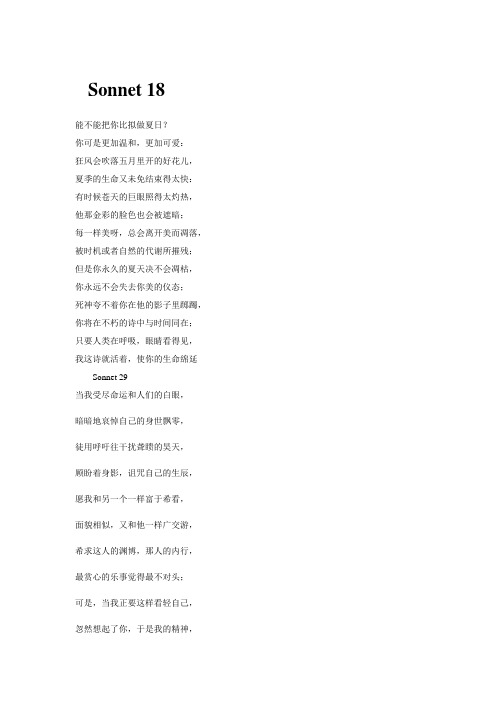
Sonnet 18能不能把你比拟做夏日?你可是更加温和,更加可爱:狂风会吹落五月里开的好花儿,夏季的生命又未免结束得太快:有时候苍天的巨眼照得太灼热,他那金彩的脸色也会被遮暗;每一样美呀,总会离开美而凋落,被时机或者自然的代谢所摧残;但是你永久的夏天决不会凋枯,你永远不会失去你美的仪态;死神夸不着你在他的影子里踯躅,你将在不朽的诗中与时间同在;只要人类在呼吸,眼睛看得见,我这诗就活着,使你的生命绵延Sonnet 29当我受尽命运和人们的白眼,暗暗地哀悼自己的身世飘零,徒用呼吁往干扰聋瞆的昊天,顾盼着身影,诅咒自己的生辰,愿我和另一个一样富于希看,面貌相似,又和他一样广交游,希求这人的渊博,那人的内行,最赏心的乐事觉得最不对头;可是,当我正要这样看轻自己,忽然想起了你,于是我的精神,便像云雀破晓从阴霾的大地振翮上升,高唱着圣歌在天门:一想起你的爱使我那么富有,和帝王换位我也不屑于屈就。
SONNET 106十四行诗第106首[英] 莎士比亚When in the chronicle of wasted time 我看到往昔年代的史书-I see descriptions of the fairest wights, 对风流人物的详尽绘述,And beauty making beautiful old rhyme 美艳成就了古老的诗赋-In praise of ladies dead, and lovely knights, 赞翩翩骑士和绝代尤物;Then in the blazon of sweet beauty’s best, 那么,这些对绝色的夸耀, Of hand, of foot, of lip, of eye, of brow, 手足与朱唇、靓眸与眉毛,I see their antique pen would have express’d 依稀这表述之古风笔调-Even such a beauty as you master now. 宛然你而今的潇洒风貌。
Sonnet
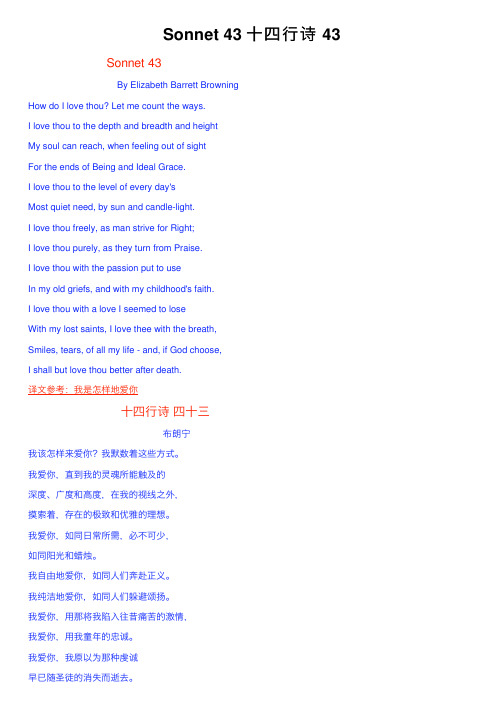
Sonnet 43 ⼗四⾏诗 43 Sonnet 43By Elizabeth Barrett BrowningHow do I love thou? Let me count the ways.I love thou to the depth and breadth and heightMy soul can reach, when feeling out of sightFor the ends of Being and Ideal Grace.I love thou to the level of every day'sMost quiet need, by sun and candle-light.I love thou freely, as man strive for Right;I love thou purely, as they turn from Praise.I love thou with the passion put to useIn my old griefs, and with my childhood's faith.I love thou with a love I seemed to loseWith my lost saints, I love thee with the breath,Smiles, tears, of all my life - and, if God choose,I shall but love thou better after death.译⽂参考:我是怎样地爱你⼗四⾏诗四⼗三布朗宁我该怎样来爱你?我默数着这些⽅式。
我爱你,直到我的灵魂所能触及的深度、⼴度和⾼度,在我的视线之外,摸索着,存在的极致和优雅的理想。
我爱你,如同⽇常所需,必不可少,如同阳光和蜡烛。
我⾃由地爱你,如同⼈们奔赴正义。
我纯洁地爱你,如同⼈们躲避颂扬。
莎士比亚十四行诗第十八首

莎士比亚十四行诗第十八首Sonnet 18 铁冰译文1 Shall I compare thee to a summer's day 我该不该把你比作怡人的夏天?2 Thou art more lovely and more temperate: 你却比她更加可爱更加温情。
3 Rough winds do shake the darling buds of May, 五月的娇蕊总是被狂风吹断,4 And summer's lease hath all too short a date: 夏天也只是一道短暂的美景。
5 Sometime too hot the eye of heaven shines, 苍穹的目光有时会过于灼热,6 And often is his gold complexion dimm'd; 那金色的脸庞也常黯淡无光。
7 And every fair from fair sometime declines, 人间一切瑰丽终将失去秀色,8 By chance, or nature's changing course, untrimm'd; 湮没于不测风云和世事沧桑。
9 But thy eternal summer shall not fade, 但是,你常青的夏季永不消逝,10 Nor lose possession of that fair thou owest; 你拥有的美丽也将永不折损,11 Nor shall Death brag thou wander'st in his shade, 或许死神的阴影会笼罩着你,12 When in eternal lines to time thou growest; 你却和这不朽的诗句千古长存。
13 So long as men can breathe, or eyes can see, 只要人类还在呼吸、眼睛还在欣赏,14 So long lives this, and this gives life to thee. 我的诗就会活着,令你生命绽放。
莎士比亚sonnet及其翻译

精心整理SONNET 106 十四行诗第106首[英] 莎士比亚
When in the chronicle of wasted time 我看到往昔年代的史书-
I see descriptions of the fairest wights, 对风流人物的详尽绘述,And beauty making beautiful old rhyme 美艳成就了古老的诗赋-
时;
-by William Shakespeare (1564-1616)
附1]:卞之琳译本-
过往世代的记载里常常见到
前人把最俊俏人物描摹尽致,
美貌如何使古老的诗句也美妙,
配得上歌颂美女和风流骑士,
看人家夸赞美貌是怎样的无比,
什么手,什么脚,什么嘴,什么眼,什么眉,我总是看出来他们古雅的手笔
差不多恰好表现了你的秀美。
[附
于是我发现古代的文笔早就
表达出来了你今天具有的美貌。
那么,古人的赞辞都只是预言—
预言了我们这时代:你的仪态;
但古人只能用预想的眼睛测看,
还不能充分歌唱出你的价值来:至于我们呢,看见了今天的景象,有眼睛惊讶,却没有舌头会颂扬。
[附7]:铁冰译本-
我从远古时代的历史记载里
在时间的无涯记事里,
绝代芳华被前人描尽,
天姿使古老诗句韵起,
颂扬远逝的佳人武衿;
生花妙笔成就美俊,
纤手玉足唇小眉眼清,古笔朴拙墨香传神韵,美人如伊小立黯繁星;华章丽藻携佳句天成,穿越时空描摹你容颜,。
sonnet的押韵和形式
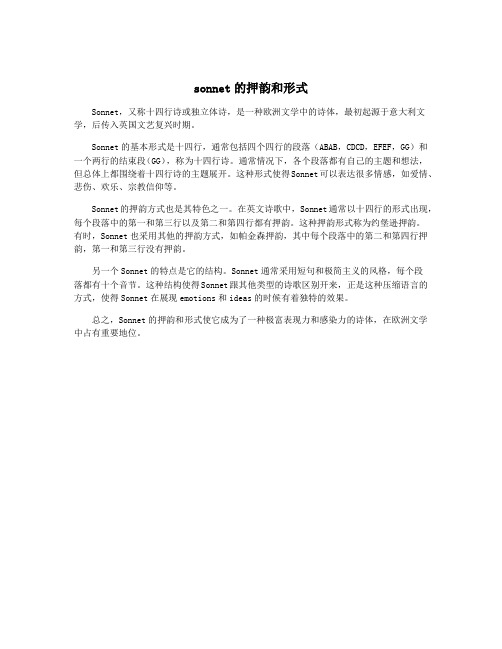
sonnet的押韵和形式
Sonnet,又称十四行诗或独立体诗,是一种欧洲文学中的诗体,最初起源于意大利文学,后传入英国文艺复兴时期。
Sonnet的基本形式是十四行,通常包括四个四行的段落(ABAB,CDCD,EFEF,GG)和一个两行的结束段(GG),称为十四行诗。
通常情况下,各个段落都有自己的主题和想法,但总体上都围绕着十四行诗的主题展开。
这种形式使得Sonnet可以表达很多情感,如爱情、悲伤、欢乐、宗教信仰等。
Sonnet的押韵方式也是其特色之一。
在英文诗歌中,Sonnet通常以十四行的形式出现,每个段落中的第一和第三行以及第二和第四行都有押韵。
这种押韵形式称为约堡逊押韵。
有时,Sonnet也采用其他的押韵方式,如帕金森押韵,其中每个段落中的第二和第四行押韵,第一和第三行没有押韵。
另一个Sonnet的特点是它的结构。
Sonnet通常采用短句和极简主义的风格,每个段
落都有十个音节。
这种结构使得Sonnet跟其他类型的诗歌区别开来,正是这种压缩语言的方式,使得Sonnet在展现emotions和ideas的时候有着独特的效果。
总之,Sonnet的押韵和形式使它成为了一种极富表现力和感染力的诗体,在欧洲文学中占有重要地位。
sonnet18的写作风格
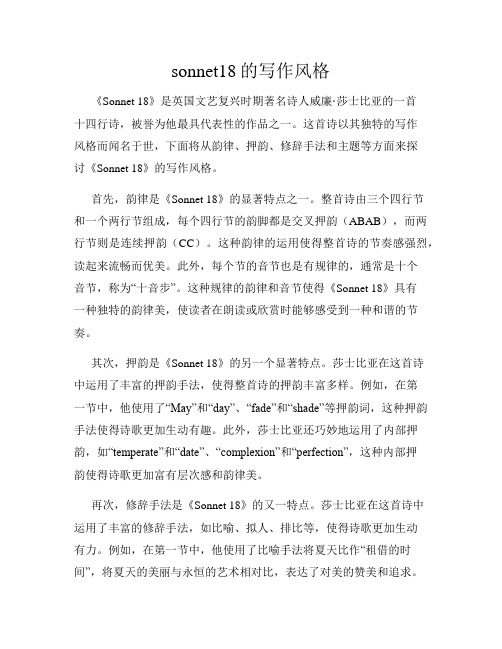
sonnet18的写作风格《Sonnet 18》是英国文艺复兴时期著名诗人威廉·莎士比亚的一首十四行诗,被誉为他最具代表性的作品之一。
这首诗以其独特的写作风格而闻名于世,下面将从韵律、押韵、修辞手法和主题等方面来探讨《Sonnet 18》的写作风格。
首先,韵律是《Sonnet 18》的显著特点之一。
整首诗由三个四行节和一个两行节组成,每个四行节的韵脚都是交叉押韵(ABAB),而两行节则是连续押韵(CC)。
这种韵律的运用使得整首诗的节奏感强烈,读起来流畅而优美。
此外,每个节的音节也是有规律的,通常是十个音节,称为“十音步”。
这种规律的韵律和音节使得《Sonnet 18》具有一种独特的韵律美,使读者在朗读或欣赏时能够感受到一种和谐的节奏。
其次,押韵是《Sonnet 18》的另一个显著特点。
莎士比亚在这首诗中运用了丰富的押韵手法,使得整首诗的押韵丰富多样。
例如,在第一节中,他使用了“May”和“day”、“fade”和“shade”等押韵词,这种押韵手法使得诗歌更加生动有趣。
此外,莎士比亚还巧妙地运用了内部押韵,如“temperate”和“date”、“complexion”和“perfection”,这种内部押韵使得诗歌更加富有层次感和韵律美。
再次,修辞手法是《Sonnet 18》的又一特点。
莎士比亚在这首诗中运用了丰富的修辞手法,如比喻、拟人、排比等,使得诗歌更加生动有力。
例如,在第一节中,他使用了比喻手法将夏天比作“租借的时间”,将夏天的美丽与永恒的艺术相对比,表达了对美的赞美和追求。
此外,在整首诗中,莎士比亚还使用了拟人手法,如将太阳形容为“眼睛”,将死亡形容为“永恒的睡眠”,这种拟人手法使得诗歌更加生动有趣,给人以强烈的视觉和感官的冲击。
最后,主题是《Sonnet 18》的核心。
整首诗以赞美之情贯穿始终,表达了诗人对美的追求和对爱情的赞美。
诗人通过将夏天的美丽与艺术相对比,表达了对美的追求和对永恒的渴望。
sonnet18的修辞手法

sonnet18的修辞手法
Sonnet 18是莎士比亚的一首十四行诗,也被称为"Shall I compare thee to a summer's day?",它使用了多种修辞手法来强化诗歌的表达和情感。
首先,Sonnet 18中使用了比喻。
诗中作者将自己的恋人比作夏日,以突出其美丽和永恒的特质。
这种比喻使读者能够更清晰地感受到作者对恋人的赞美和珍视。
其次,Sonnet 18使用了拟人。
在诗中,夏天被拟人化为时而太热、时而太凉的人物,以突出恋人的永恒美丽。
这种拟人手法使得读者更容易将诗中的情感和形象与自己的生活经验联系起来。
此外,Sonnet 18还使用了对比。
诗中作者将夏天的美丽与恋人的美丽进行对比,强调了恋人的美丽胜过夏天的美丽。
这种对比手法使得诗中的情感更加鲜明,让读者更深刻地感受到作者对恋人的赞美之情。
最后,Sonnet 18还使用了排比。
在诗中,作者通过排比的手法列举了夏天的缺点和变化,以突出恋人的永恒美丽。
这种排比的
修辞手法使得诗歌更加生动和有力,增强了诗中情感的表达和力量。
总的来说,Sonnet 18使用了比喻、拟人、对比和排比等多种
修辞手法,这些手法使得诗歌更加丰富和生动,突出了作者对恋人
美丽的赞美和珍视。
SONNET莎士比亚十四行诗全文
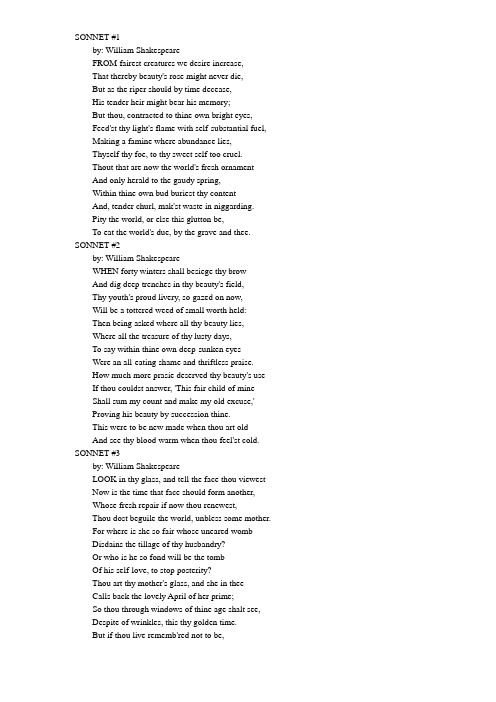
SONNET #1by: William ShakespeareFROM fairest creatures we desire increase,That thereby beauty's rose might never die,But as the riper should by time decease,His tender heir might bear his memory;But thou, contracted to thine own bright eyes,Feed'st thy light's flame with self-substantial fuel,Making a famine where abundance lies,Thyself thy foe, to thy sweet self too cruel.Thout that are now the world's fresh ornamentAnd only herald to the gaudy spring,Within thine own bud buriest thy contentAnd, tender churl, mak'st waste in niggarding.Pity the world, or else this glutton be,To eat the world's due, by the grave and thee. SONNET #2by: William ShakespeareWHEN forty winters shall besiege thy browAnd dig deep trenches in thy beauty's field,Thy youth's proud livery, so gazed on now,Will be a tottered weed of small worth held:Then being asked where all thy beauty lies,Where all the treasure of thy lusty days,To say within thine own deep-sunken eyesWere an all-eating shame and thriftless praise.How much more prasie deserved thy beauty's useIf thou couldst answer, 'This fair child of mineShall sum my count and make my old excuse,'Proving his beauty by succession thine.This were to be new made when thou art oldAnd see thy blood warm when thou feel'st cold. SONNET #3by: William ShakespeareLOOK in thy glass, and tell the face thou viewestNow is the time that face should form another,Whose fresh repair if now thou renewest,Thou dost beguile the world, unbless some mother.For where is she so fair whose uneared wombDisdains the tillage of thy husbandry?Or who is he so fond will be the tombOf his self-love, to stop posterity?Thou art thy mother's glass, and she in theeCalls back the lovely April of her prime;So thou through windows of thine age shalt see,Despite of wrinkles, this thy golden time.But if thou live rememb'red not to be,Die single, and thine image dies with thee. SONNET #4by: William ShakespeareUNTHRIFTY loveliness, why dost thou spendUpon thyself they beauty's legacy?Nature's bequest gives nothing but doth lend,And, being frank, she lends to those are free.Then, beateous niggard, why dost thou abuseThe bounteous largess given thee to give?Profitless userer, why dost thou useSo great a sum of sums, yet canst not live?For, having traffic with thyself alone,Thou of thyself thy sweet self dost deceive:Then how, when Nature calls thee to be gone,What acceptable audit canst thou leave?Thy unused beauty must be tombed with thee,Which, usèd, lives th' executor to be.SONNET #5by: William ShakespeareTHOSE hours that with gentle work did frameThe lovely gaze where every eye doth dwellWill play the tyrants to the very sameAnd that unfair which fairly doth excel;For never-resting time leads summer onTo hideous winter and confounds him there,Sap checked with frost and lusty leaves quite gone,Beauty o'ersnowed and bareness everywhere.Then, were not summer's distillation leftA liquid prisoner pent in walls of glass,Beauty's effect with beauty were bereft,Nor it nor no remembrance what it was:But flowers distilled, though they with winter meet,Leese but there snow; their substance still lives sweet. SONNET #6by: William ShakespeareTHEN let not winter's ragged hand defaceIn thee thy summer ere thou be distilled:Make sweet some vial; treasure thou some placeWith beauty's treasure ere it be self-killed.That use is not forbidden usuryWhich happies those that pay the willing loan;That's for thyself to breed another thee,Or ten times happier be it ten for one.Ten times thyself were happier than thou art,If ten of thine ten times refigured thee:Then what could death do if thou shouldst depart,Leaving thee living in posterity?Be not self-willed, for thou art much too fairTo be death's conquest and make worms thine heir. SONNET #7by: William ShakespeareLO, in the orient when the gracious lightLifts up his burning head, each under eyeDoth homage to his new-appearing sight,Serving with looks his sacred majesty;And having climbed the steep-up heavenly hill,Resembling strong yough in his middle age,Yet mortal looks adore his beauty still,Attending on his golden pilgrimage;But when from highmost pitch, with weary car,Like feeble age he reeleth from the day,The eyes, fore duteous, now converted areFrom his low tract and look another way:So thou, thyself outgoing in thy noon,Unlooked on diest unless thou get a son. SONNET #8by: William ShakespeareMUSIC to hear, why hear'st thou music sadly?Sweets with sweets war not, joy delights in joy:Why lov'st thou that which thou receiv'st not gladly, Or else receiv'st with pleasure thine annoy?If the true concord of well-tunèd sounds,By unions married, do offend thine ear,They do but sweetly chide thee, who confoundsIn singleness the parts that thou shouldst bear.Mark how one string, sweet husband to another,Strikes each in each by mutual ordering;Resembling sire and child and happy mother,Who, all in one, one pleasing note do sing;Whose speechless song, being many, seeming one,Sings this to thee, 'Thou single wilt prove none.' SONNET #9by: William ShakespeareIS it for fear to wet a widow's eyeThat thou consum'st thyself in single life?Ah, if thou issueless shalt hap to die,The world will wail thee like a makeless wife;The world will be thy widow, and still weepThat thou no form of thee hast left behind,When every private widow well may keep,By children's eyes, her husband's shape in mind.Look what an unthrift in the world doth spendShifts but his place, for still the world enjoys it;But beauty's waste hath in the world an end,And, kept unused, the user so destroys it:No love toward others in that bosom sitsThan on himself such murd'rous shame commits SONNET #10by: William ShakespeareFOR shame, deny that thou bear'st love to anyWho for thyself art so unprovident:Grant, if thou wilt, thou art beloved of many,But that thou none lov'st is most evident;For thou art so possessed with murd'rous hateThat 'gainst thyself thou stick'st not to conspire,Seeking that beauteous roof to ruinateWhich to repair should be thy chief desire.O, change thy thought, that I may change my mind;Shall hate be fairer lodged than gentle love?Be as thy presence is, gracious and kind,Or to thyself at least kind-hearted prove:Make thee another self for love of me,That beauty still may live in thine or thee.SONNET #11by: William ShakespeareAS fast as thou shalt wane, so fast thou grow'stIn one of thine, from that which thou departest;And that fresh blood which youngly thou bestow'stThou mayst call thine when thou from youth convertest.Herein lives wisdom, beauty, and increase;Without this, folly, age, and cold decay.If all were minded so, the times should cease,And threescore year would make the world away.Let those whom Nature hath not made for store,Harsh, featureless, and rude, barrenly perish:Look whom she best endowed she gave the more,Which bounteous gift thou shouldst in bounty cherish.She carved thee for her seal, and meant therebyThou shouldst print more, not let that copy die. SONNET #12by: William ShakespeareWHEN I do count the clock that tells the timeAnd see the brave day sunk in hideous night,When I behold the violet past primeAnd sable curls all silvered o'er with white,When lofty trees I see barren of leaves,Which erst from heat did canopy the herd,And summer's green all girded up in sheavesBorne on the bier with white and bristly beard;Then of thy beauty do I question makeThat thou among the wastes of time must go,Since sweets and beauties do themselves forsakeAnd die as fast as they see others grow;And nothing 'gainst Time's scythe can make defense Save breed, to brave him when he takes thee hence. SONNET #13by: William ShakespeareO , THAT you were yourself, but, love, you areNo longer yours than you yourself here live:Against this coming end you should prepare,And your sweet semblance to some other give.So should that beauty which you hold in leaseFind no determination; then you wereYourself again after yourself's deceaseWhen your sweet issue your sweet form should bear.Who lets so fair a house fall to decay,Which husbandry in honor might upholdAgainst the stormy gusts of winter's dayAnd barren rage of death's eternal cold?O, none but unthrifts! Dear my love, you knowYou had a father -- let your son say so.SONNET #14by: William ShakespeareNOT from the stars do I my judgment pluck,And yet methinks I have astronomy;But not to tell of good or evil luck,Of plagues, of dearths, or season's quality;Nor can I fortune to brief minutes tell,Pointing to each his thunder, rain, and wind,Or say with princes if it shall go wellBy oft predict that I in heaven find;But from thine eyes my knowledge I derive,And, constant stars, in them I read such artAs truth and beauty shall together thriveIf from thyself to store thou wouldst convert:Or else of thee this I prognosticate,Thy end is truth's and beauty's doom and date. SONNET #15by: William ShakespeareWHEN I consider everything that growsHolds in perfection but a little moment,That this huge stage presenteth nought but showsWhereon the stars in secret influence comment;When I perceive that men as plants increase,Cheerèd and checked even by the selfsame sky,V aunt in their youthful sap, at height decrease,And wear their brave state out of memory:Then the conceit of this inconstant staySets you most rich in youth before my sight,Where wasteful Time debateth with DecayTo change your day of youth to sullied night;And, all in war with Time for love of you,As he takes from you, I ingraft you new.SONNET #16by: William ShakespeareBUT wherefore do not you a mightier wayMake war upon this bloody tyrant, Time?And fortify yourself in your decayWith means more blessèd than my barren rime?Now stand you on the top of happy hours,And many maiden gardens, yet unset,With virtuous wish would bear your living flowers,Much liker than your painted counterfeit:So should the lines of life that life repairWhich this time's pencil or my pupil pen,Neither in inward worth nor outward fairCan make you live yourself in eyes of men.To give away yourself keeps yourself still,And you must live, drawn by your own sweet skill."Sonnet #16" was originally published in Shake-speares Sonnets: Never before Imprinted (1609).SONNET #17by: William ShakespeareHO will believe my verse in time to comeIf it were filled with your most high deserts?Though yet, heaven knows, it is but as a tombWhich hides your life and shows not half your parts.If I could write the beauty of your eyesAnd in fresh numbers number all your graces,The age to come would say, 'This poet lies--Such heavenly touches ne'er touched earthly faces.'So should my papers, yellowed with their age,Be scorned, like old men of less truth than tongue,And your true rights be termed a poet's rageAnd stretchèd metre of an antique song.But were some child of yours alive that time,You should live twice--in it and in my rime."Sonnet #17" was originally published in Shake-speares Sonnets: Never before Imprinted (1609).SONNET #18by: William ShakespeareShall I compare thee to a summer's day?Thou art more lovely and more temperate.Rough winds do shake the darling buds of May,And summer's lease hath all too short a date.Sometime too hot the eye of heaven shines,And often is his gold complexion dimmed;And every fair from fair sometime declines,By chance, or nature's changing course, untrimmed:But thy eternal summer shall not fadeNor lose possession of that fair thou ow'st,Nor shall Death brag thou wand'rest in his shadeWhen in eternal lines to time thou grow'st.So long as men can breathe or eyes can see,So long lives this, and this gives life to thee."Sonnet #18" was originally published in Shake-speares Sonnets: Never before Imprinted (1609).SONNET #19by: William ShakespeareDevouring time, blunt thou the lion's paws,And make the earth devour her own sweet brood;Pluck the keen teeth from the fierce tiger's jaws,And burn the long-lived phoenix in her blood;Make glad and sorry seasons as they fleet'st,And do whate'er thou wilt, swift-footed Time,To the wide world and all her fading sweets,But I forbid thee one most heinous crime:O, carve not with thy hours my love's fair brow,Nor draw no lines there with thine antique pen;Him in thy course untainted do allowFor beauty's pattern to succeeding men.Yet do thy worst, old Time: despite thy wrong,My love shall in my verse ever live young."Sonnet #19" was originally published in Shake-speares Sonnets: Never before Imprinted (1609).SONNET #20by: William Shakespeare (1564-1616)WOMAN'S face, with Nature's own hand painted,Hast thou, the master-mistress of my passion;A woman's gentle heart, but not acquaintedWith shifting change, as is false women's fashion;An eye more bright than theirs, less false in rolling,Gilding the object whereupon it gazeth;A man in hue all hues in his controlling,Which steals men's eyes and women's souls amazeth.And for a woman wert thou first created,Till Nature as she wrought thee fell a-doting,And by addition me of thee defeatedBy adding one thing to my purpose nothing.But since she pricked thee out for women's pleasure,Mine be thy love, and thy love's use their treasure."Sonnet #20" was originally published in Shake-speares Sonnets: Never before Imprinted(1609).SONNET #21by: William Shakespeare (1564-1616)O is it not with me as with that MuseStirred by a painted beauty to his verse,Who heaven itself for ornament doth useAnd every fair with his fair doth rehearse;Making a couplement of proud compareWith sun and moon, with earth and sea's rich gems,With April's first-born flowers, and all things rareThat heaven's airs in this huge rondure hems.O let me, true in love, but truly write,And then believe me, my love is as fairAs any mother's child, though not so brightAs those gold candles fixed in heaven's air:Let them say more that like of hearsay well;I will not praise that purpose not to sell."Sonnet #21" was originally published in Shake-speares Sonnets: Never before Imprinted (1609).SONNET #22by: William Shakespeare (1564-1616)MY glass shall not persuade me I am oldSo long as youth and thou are of one date;But when in thee time's furrows I behold,Then look I death my days should expiate.For all that beauty that doth cover theeIs but the seemly raiment of my heart,Which in they breast doth live, as thine in me:How can I then be elder than thou art?O therefore, love, be of thyself so waryAs I, not for myself, but for thee will,Bearing thy heart, which I will keep so charyAs tender nurse her babe from faring ill.Presume not on thy heart when mine is slain;Thou gav'st me thine not to give back again."Sonnet #22" was originally published in Shake-speares Sonnets: Never before Imprinted (1609).SONNET #23by: William Shakespeare (1564-1616)AS an unperfect actor on the stage,Who with his fear is put besides his part,Or some fierce thing replete with too much rage,Whose strength's abundance weakens his own heart;So I, for fear of trust, forget to sayThe perfect ceremony of love's rite,And in mine own love's strength seem to decay,O'ercharged with burden of mine own love's might.O, let my books be then the eloquenceAnd dump presagers of my speaking breast,Who plead for love, and look for recompense,More than that tongue that more hath more expressed.O, learn to read what silent love hath writ:To hear with eyes belongs to love's fine wit."Sonnet #23" was originally published in Shake-speares Sonnets: Never before Imprinted (1609).SONNET #24by: William Shakespeare (1564-1616)MINE eye hath played the painter and hath stelledThy beauty's form in table of my heart;My body is the frame wherein 'tis held,And perspective it is best painter's art.For through the painter must you see his skillTo fine where your true image pictured lies,Which in my bosom's shop is hanging still,That hath his windows glazèd with thine eyes.Now see what good turns eyes for eyes have done:Mine eyes have drawn thy shape, and thine for meAre windows to my breast, wherethrough the sunDelights to peep, to gaze therein on thee.Yet eyes this cunning want to grace their art;They draw but what they see, know not the heart."Sonnet #24" was originally published in Shake-speares Sonnets: Never before Imprinted (1609).SONNET #25by: William Shakespeare (1564-1616)LET those who are in favor with their starsOf public honor and proud titles boast,Whilst I, whom fortune of such triumph bars,Unlooked for joy in that I honor most.Great princes' favorites their fair leaves spreadBut as the marigold at the sun's eye;And in themselves their pride lies burièd,For at a frown they in their glory die.The painful warrior famousèd for fight,After a thousand victories once foiled,Is from the book of honor rasèd quite,And all the rest forgot for which he toiled.Then happy I, that love and am belovedWhere I may not remove nor be removed."Sonnet #25" was originally published in Shake-speares Sonnets: Never before Imprinted (1609).SONNET #26by: William Shakespeare (1564-1616)LORD of my love, to whom in vassalageThy merit hath my duty strongly knit,To thee I send this written ambassageTo witness duty, not to show my wit;Duty so great, which wit so poor as mineMay make seem bare, in wanting words to show it,But that I hope some good coneit of thineIn thy soul's thought, all naked, will bestow it;Till whatsoever star that guides my movingPoints on me graciously with fair aspect,And puts apparel on my tottered lovingTo show me worthy of thy sweet respect:Then may I dare to boast how I do love thee;Till then not show my head where thou mayest prove me."Sonnet #26" was originally published in Shake-speares Sonnets: Never before Imprinted (1609).SONNET #27by: William Shakespeare (1564-1616)WEARY with toil, I haste to my bed,The dear repose for limbs with travel tired,But then begins a journey in my headTo work my mind when body's work's expired;For then my thoughts, from far where I abide,Intend a zealous pilgrimage to thee,And keep my drooping eyelids open wide,Looking on darkness which the blind do see;Save that my soul's imaginary sightPresents thy shadow to my sightless view,Which, like a jewel hung in ghastly night,Makes black night beauteous and her old face new.Lo, thus, by day my limbs, by night my mind,For thee and for myself no quiet find."Sonnet #27" was originally published in Shake-speares Sonnets: Never before Imprinted (1609).SONNET #28by: William Shakespeare (1564-1616)HOW can I then return in happy plightThat am debarred the benefit of rest,When day's oppression is not eased by night,And each, though enemies to either's reign,Do in consent shake hands to torture me,The one by toil, the other to complainHow far I toil, still farther off from thee?I tell the day, to please him, thou art brightAnd dost him grace when clouds do blot the heaven;So flatter I the swart-complexioned night,When sparkling stars twire not, thou gild'st the even.But day doth daily draw my sorrows longer,And night doth nightly make grief's strength seem stronger."Sonnet #28" was originally published in Shake-speares Sonnets: Never before Imprinted (1609).SONNET #29by: William Shakespeare (1564-1616)WHEN, in disgrace with Fortune and men's eyes,I all alone beweep my outcast state,And trouble deaf heaven with my bootless cries,And look upon myself and curse my fate,Wishing me like to one more rich in hope,Featured like him, like him with friend's possessed,Desiring this man's art, and that man's scope,With what I most enjoy contented least;Yet in these thoughts myself almost despising,Haply I think on thee, and then my state,Like to the lark at break of day arisingFrom sullen earth, sings hymns at heaven's gate;For thy sweet love rememb'red such wealth bringsThat then I scorn to change my state with kings."Sonnet #29" was originally published in Shake-speares Sonnets: Never before Imprinted (1609).SONNET #30by: William Shakespeare (1564-1616)WHEN to the sessions of sweet silent thoughtI summon up remembrance of things past,I sigh the lack of many a thought I sought,And with old woes new wail my dear time's waste:Then can I drown an eye, unused to flow,For precious friends hid in death's dateless night,And weep afresh love's long since cancelled woe,And moan th' expense of many a vanished sight.Then can I grieve at grievances foregone,And heavily from woe to woe tell o'erThe sad account of fore-bemoanèd moan,Which I new pay as if not paid before.But if the while I think on thee, dear friend,All losses are restored and sorrows end."Sonnet #30" was originally published in Shake-speares Sonnets: Never before Imprinted (1609).SONNET #31by: William Shakespeare (1564-1616)THY bosom is endearèd with all heartsWhich I by lacking have supposèd dead;And their reigns love, and all love's loving parts,And all those friends which I thought burièd.How many a holy and obsequious tearHath dear religious love stol'n from mine eye,As interest of the dead, which now appearBut things removed that hidden in thee lie!Thou art the grave where buried love doth live,Hung with the trophies of my lovers gone,Who all their parts of me to thee did give;That due of many now is thine alone.Their images I loved I vew in thee,And thou, all they, hast all the all of me."Sonnet #31" was originally published in Shake-speares Sonnets: Never before Imprinted (1609).SONNET #32by: William Shakespeare (1564-1616)IF thou survive my well-contented dayWhen that churl Death my bones with dust shall cover,And shalt by fortune once more resurveyThese poor rude lines of thy deceasèd lover,Compare them with the bett-ring of the time,And though they be outstripped by every pen,Reserve them for my love, not for their rime,Exceeded by the height of happier men.O, then vouchsafe me but this loving thought:'Had my friend's Muse grown with this growing age,A dearer birth than this his love had broughtTo march in ranks of better equipage;But since he died, and poets better prove,Theirs for their style I'll read, his for his love.'。
sonnet 18诗歌赏析
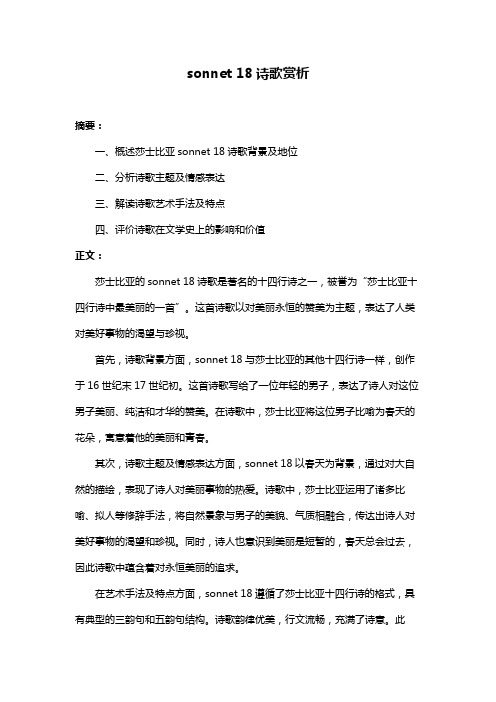
sonnet 18诗歌赏析摘要:一、概述莎士比亚sonnet 18诗歌背景及地位二、分析诗歌主题及情感表达三、解读诗歌艺术手法及特点四、评价诗歌在文学史上的影响和价值正文:莎士比亚的sonnet 18诗歌是著名的十四行诗之一,被誉为“莎士比亚十四行诗中最美丽的一首”。
这首诗歌以对美丽永恒的赞美为主题,表达了人类对美好事物的渴望与珍视。
首先,诗歌背景方面,sonnet 18与莎士比亚的其他十四行诗一样,创作于16世纪末17世纪初。
这首诗歌写给了一位年轻的男子,表达了诗人对这位男子美丽、纯洁和才华的赞美。
在诗歌中,莎士比亚将这位男子比喻为春天的花朵,寓意着他的美丽和青春。
其次,诗歌主题及情感表达方面,sonnet 18以春天为背景,通过对大自然的描绘,表现了诗人对美丽事物的热爱。
诗歌中,莎士比亚运用了诸多比喻、拟人等修辞手法,将自然景象与男子的美貌、气质相融合,传达出诗人对美好事物的渴望和珍视。
同时,诗人也意识到美丽是短暂的,春天总会过去,因此诗歌中蕴含着对永恒美丽的追求。
在艺术手法及特点方面,sonnet 18遵循了莎士比亚十四行诗的格式,具有典型的三韵句和五韵句结构。
诗歌韵律优美,行文流畅,充满了诗意。
此外,诗人巧妙地运用了押韵、抑扬顿挫等手法,使诗歌更具音乐性。
在语言上,莎士比亚运用了大量生动的描绘性词汇,形象地展现了大自然的美丽。
最后,在文学史上的影响和价值方面,sonnet 18被誉为莎士比亚十四行诗的代表作之一,对后世文学创作产生了深远的影响。
这首诗歌展示了莎士比亚卓越的文学才华和审美观,为后世诗人树立了典范。
同时,sonnet 18也成为了英语文学史上不可或缺的一部分,丰富了英语诗歌的传统。
总之,莎士比亚的sonnet 18是一首表达了对美丽永恒追求的诗歌。
通过对春天景象和男子美貌的赞美,诗人展现了人类对美好事物的渴望与珍视。
Sonnet
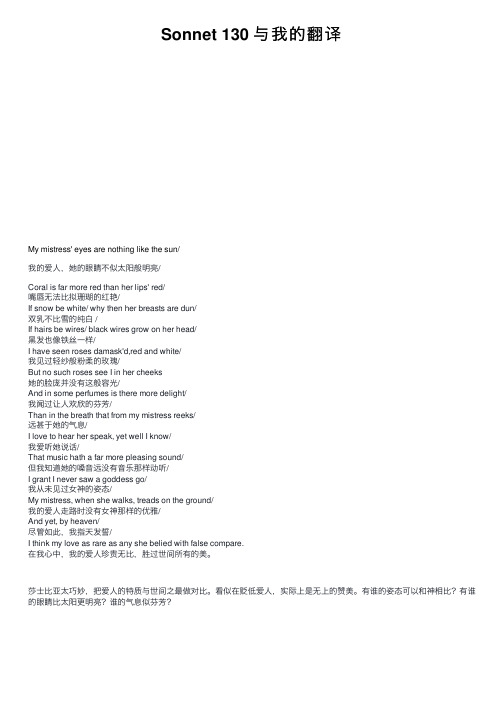
Sonnet 130 与我的翻译My mistress' eyes are nothing like the sun/我的爱⼈,她的眼睛不似太阳般明亮/Coral is far more red than her lips' red/嘴唇⽆法⽐拟珊瑚的红艳/If snow be white/ why then her breasts are dun/双乳不⽐雪的纯⽩ /If hairs be wires/ black wires grow on her head/⿊发也像铁丝⼀样/I have seen roses damask'd,red and white/我见过轻纱般粉柔的玫瑰/But no such roses see I in her cheeks她的脸庞并没有这般容光/And in some perfumes is there more delight/我闻过让⼈欢欣的芬芳/Than in the breath that from my mistress reeks/远甚于她的⽓息/I love to hear her speak, yet well I know/我爱听她说话/That music hath a far more pleasing sound/但我知道她的嗓⾳远没有⾳乐那样动听/I grant I never saw a goddess go/我从未见过⼥神的姿态/My mistress, when she walks, treads on the ground/我的爱⼈⾛路时没有⼥神那样的优雅/And yet, by heaven/尽管如此,我指天发誓/I think my love as rare as any she belied with false compare.在我⼼中,我的爱⼈珍贵⽆⽐,胜过世间所有的美。
莎⼠⽐亚太巧妙,把爱⼈的特质与世间之最做对⽐。
莎士比亚第30首sonnet
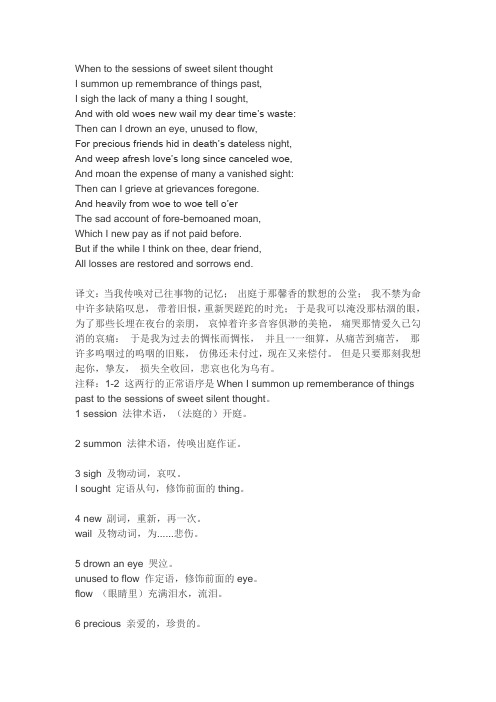
When to the sessions of sweet silent thoughtI summon up remembrance of things past,I sigh the lack of many a thing I sought,And with old woes new wail my dear time’s waste:Then can I drown an eye, unused to flow,For precious friends hid in death’s dat eless night,And weep afresh love’s long since canceled woe,And moan the expense of many a vanished sight:Then can I grieve at grievances foregone.And heavily from woe to woe tell o’erThe sad account of fore-bemoaned moan,Which I new pay as if not paid before.But if the while I think on thee, dear friend,All losses are restored and sorrows end.译文:当我传唤对已往事物的记忆;出庭于那馨香的默想的公堂;我不禁为命中许多缺陷叹息,带着旧恨,重新哭蹉跎的时光;于是我可以淹没那枯涸的眼,为了那些长埋在夜台的亲朋,哀悼着许多音容俱渺的美艳,痛哭那情爱久已勾消的哀痛:于是我为过去的惆怅而惆怅,并且一一细算,从痛苦到痛苦,那许多呜咽过的呜咽的旧账,仿佛还未付过,现在又来偿付。
但是只要那刻我想起你,挚友,损失全收回,悲哀也化为乌有。
注释:1-2 这两行的正常语序是When I summon up rememberance of things past to the sessions of sweet silent thought。
英国文学 讲解Sonnet共55页
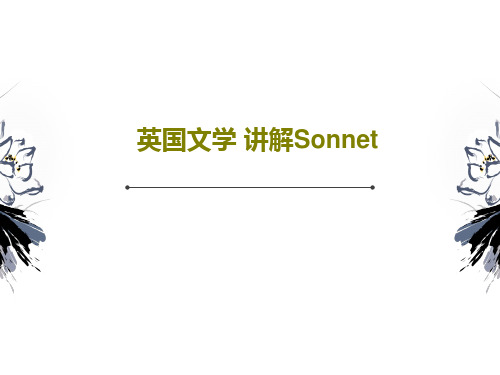
46、我们若已接受最坏的,就再没有什么损失。——卡耐基 47、书到用时方恨少、事非经过不知难。——陆游 48、书籍把我们引入最美好的社会,使我们认识各个时代的伟大智者。——史美尔斯 49、熟读唐诗三百首,不会作诗也会吟。——孙洙 50、谁和我一样用功,谁就会和我一样成功。——莫扎特
英国文学 讲解Sonnet
36、“不可能”这个字(法语是一个字 ),只 在愚人 的字典 中找得 到。--拿 破仑。 37、不要生气要争气,不要看破要突 破,不 要嫉妒 要欣赏 ,不要 托延要 积极, 不要心 动要行 动。 38、勤奋,机会,乐观是成功的三要 素。(注 意:传 统观念 认为勤 奋和机 会是成 功的要 素,但 是经过 统计学 和成功 人士的 分析得 出,乐 观是成 功的第 三要素 。
Sonnet18及赏析
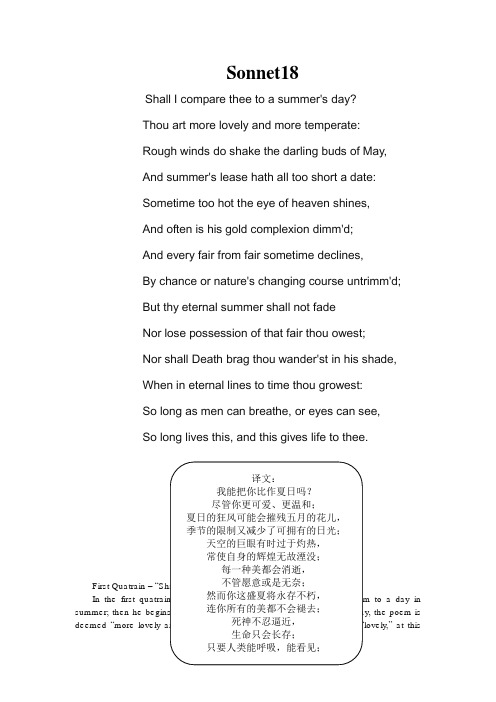
Sonnet18Shall I compare thee to a summer's day?Thou art more lovely and more temperate: Rough winds do shake the darling buds of May, And summer's lease hath all too short a date: Sometime too hot the eye of heaven shines,And often is his gold complexion dimm'd;And every fair from fair sometime declines,By chance or nature's changing course untrimm'd; But thy eternal summer shall not fadeNor lose possession of that fair thou owest;Nor shall Death brag thou wander'st in his shade, When in eternal lines to time thou growest:So long as men can breathe, or eyes can see,So long lives this, and this gives life to thee.point, seems to be just the speaker’s opinion, but to prove the poem more temperate, he explains, “Rough winds do shake the darling buds of May”: the “rough winds” that blow the young buds of flowers about is certainly not mild or temperate. And also summer just does not last very long; it has “all too short a date.”The poem, when compared to a summer’s day, is better; its beauty and mildness do not end as summer along with its “summer’s day”does. The reader wonder why the speaker, just after claiming his intention of comparing the poem to a “summer’s day,” then first compares it to a spring day—“the darling buds of May.”Even before summer begins, the May flowers are being tossed about by intemperate breezes; therefore, it stands to reason that if the prelude to summer has its difficulties, one can expect summer have its own unique problems that the poem, of course, will lack.Second Quatrain –“Sometime too hot the eye of heaven shines”In the second quatrain, the speaker continues elucidating his complaints that diminish summer’s value in this comparison: sometimes the sunshine makes the temperature too hot: “Sometime too hot the eye of heaven shines.” The sun often hides behind clouds, “often is his gold complexion dimm’d.” The reader can realize the implications here: that these inconvenient qualities do no plague the poem.Then the speaker makes a generalization that everything in nature including the seasons—and he has chosen the best season, after all; he did not advantage his argument by comparing the poem to a winter day—and even people degenerates with time, either by happenstance or by processes the human mind does not comprehend or simply by the unstoppable course of nature: "And every fair from fair sometime declines, / By chance, or nature’s changing course untrimm’d.”So far, the speaker has mused that he shall compare the poem to a summer day, and the summer day is losing: even before summer begins, the winds of May are often brutal to the young flowers; summer never lasts long; sometimes the sun is too hot and sometimes it hides behind clouds, and besides everything—even the good things—in nature diminishes in time.Third Quatrain –“But thy eternal summer shall not fade”In the third quatrain, the speaker declares the advantages that the poem has over the summer day: that unlike the summer day, the poem shall remain eternally; its summer will not end as the natural summer day must. Nor will the poem lose its beauty, and even death cannot claim the poem, because it will exist “in eternal lines”that the poet will continue to write, “When in eternal lines to time thou grow’st.”The Couplet –“This gives life to thee”The couplet—“So long as men can breathe, or eyes can see, / So long lives this, and this gives life to thee”—claims that as long as someone is alive to read it, the poem will have life.。
sonnect1格律划分
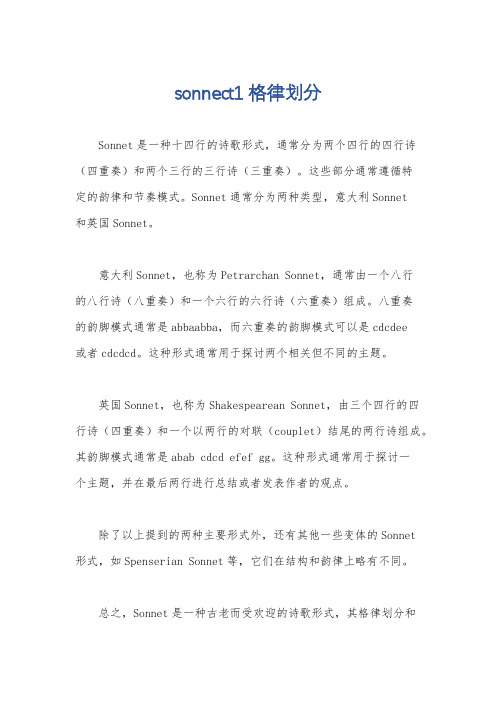
sonnect1格律划分
Sonnet是一种十四行的诗歌形式,通常分为两个四行的四行诗(四重奏)和两个三行的三行诗(三重奏)。
这些部分通常遵循特
定的韵律和节奏模式。
Sonnet通常分为两种类型,意大利Sonnet
和英国Sonnet。
意大利Sonnet,也称为Petrarchan Sonnet,通常由一个八行
的八行诗(八重奏)和一个六行的六行诗(六重奏)组成。
八重奏
的韵脚模式通常是abbaabba,而六重奏的韵脚模式可以是cdcdee
或者cdcdcd。
这种形式通常用于探讨两个相关但不同的主题。
英国Sonnet,也称为Shakespearean Sonnet,由三个四行的四
行诗(四重奏)和一个以两行的对联(couplet)结尾的两行诗组成。
其韵脚模式通常是abab cdcd efef gg。
这种形式通常用于探讨一
个主题,并在最后两行进行总结或者发表作者的观点。
除了以上提到的两种主要形式外,还有其他一些变体的Sonnet
形式,如Spenserian Sonnet等,它们在结构和韵律上略有不同。
总之,Sonnet是一种古老而受欢迎的诗歌形式,其格律划分和
韵律模式对于诗人来说是非常重要的,因为它们帮助诗人在有限的空间内表达复杂的思想和情感。
sonnet的来源和发展

2010-03-03 14:36十四行诗,又译“商籁体”,为意大利文sonetto,英文Sonnet、法文sonnet 的音译。
欧洲一种格律严谨的抒情诗体。
最初流行于意大利,彼特拉克的创作使其臻于完美,又称“彼特拉克体”,后传到欧洲各国。
由两节四行诗和两节三行诗组成,每行11个音节,韵式为ABBA,ABBA,CDE,CDE或ABBA,ABBA,CDC,CDC。
另一种类型称为“莎士比亚体”(Shakespearean)或“伊丽莎白体”,由三节四行诗和两行对句组成,每行10个音节,韵式为ABAB,CDCD,EFEF,GG。
十四行诗的历史自欧洲进入文艺复兴时代之后,这种诗体获得广泛的运用。
意大利的诗人彼得拉克成了运用十四行诗体最主要的代表。
他一生写了三百七十五首十四行诗,汇集成《抒情诗集》,献给他的情人劳拉。
在他笔下的十四行诗,每首分成两部分:前一部分由两段四行诗组成,后一部分由两段三行诗组成,即按四、四、三、三编排。
其押韵格式为ABBA,ABBA,CDE,CDE或ABBA,ABBA,CDC,CDC。
每行诗句十一个章节,通常用抑扬格。
彼得拉克的十四行诗形式整齐,音韵优美,以歌颂爱情,表现人文主人思想为主要内容。
他的诗作在内容和形式方面,都为欧洲资产阶级抒情诗的发展开拓了新路。
同时代的意大利诗人和后来其他国家的一些诗人,都曾把彼得拉克的诗作,视为十四行诗的典范,竞相仿效。
因此,人们又称它为彼得拉克诗体。
十六世纪初,十四行诗体传到英国,风行一时,到十六世纪末,十四行诗已成了英国最流行的诗歌体裁。
产生了锡德尼、斯宾塞等著名的十四行诗人。
莎士比亚进一步发展并丰富了这一诗体,一生写下一百五十四首十四行诗。
莎士比亚的诗作,改变了彼得拉克的格式,由三段四行和一副对句组成,即按四、四、四、二编排,其押韵格式为ABAB,CDCD,EFEF,GG。
每行诗句有十个抑扬格音节。
莎士比亚的十四行诗,比彼得拉克更向前迈进一步,主题更为鲜明丰富,思路曲折多变,起承转合运用自如,常常在最后一副对句中点明题意。
sonnet名词解释
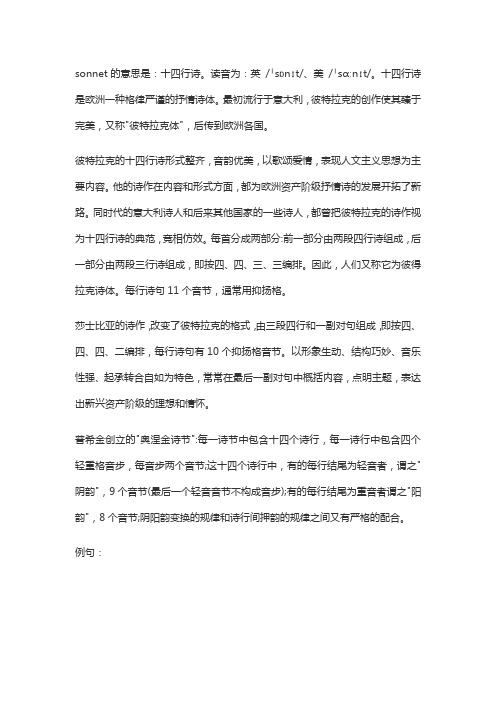
sonnet的意思是:十四行诗。
读音为:英/ˈsɒnɪt/、美/ˈsɑːnɪt/。
十四行诗是欧洲一种格律严谨的抒情诗体。
最初流行于意大利,彼特拉克的创作使其臻于完美,又称"彼特拉克体",后传到欧洲各国。
彼特拉克的十四行诗形式整齐,音韵优美,以歌颂爱情,表现人文主义思想为主要内容。
他的诗作在内容和形式方面,都为欧洲资产阶级抒情诗的发展开拓了新路。
同时代的意大利诗人和后来其他国家的一些诗人,都曾把彼特拉克的诗作视为十四行诗的典范,竞相仿效。
每首分成两部分:前一部分由两段四行诗组成,后一部分由两段三行诗组成,即按四、四、三、三编排。
因此,人们又称它为彼得拉克诗体。
每行诗句11个音节,通常用抑扬格。
莎士比亚的诗作,改变了彼特拉克的格式,由三段四行和一副对句组成,即按四、四、四、二编排,每行诗句有10个抑扬格音节。
以形象生动、结构巧妙、音乐性强、起承转合自如为特色,常常在最后一副对句中概括内容,点明主题,表达出新兴资产阶级的理想和情怀。
普希金创立的"奥涅金诗节":每一诗节中包含十四个诗行,每一诗行中包含四个轻重格音步,每音步两个音节;这十四个诗行中,有的每行结尾为轻音者,谓之"阴韵",9个音节(最后一个轻音音节不构成音步);有的每行结尾为重音者谓之"阳韵",8个音节;阴阳韵变换的规律和诗行间押韵的规律之间又有严格的配合。
例句:1.The sonnet, along with other Italian forms, was introduced to England in the sixteenth century by Sir Thomas Wyatt. 16世纪初,十四行诗连同其他一些意大利文学形式,由托马斯·怀特引入英格兰。
2.The composer set a sonnet to music. 作曲家为一首十四行诗谱了曲。
- 1、下载文档前请自行甄别文档内容的完整性,平台不提供额外的编辑、内容补充、找答案等附加服务。
- 2、"仅部分预览"的文档,不可在线预览部分如存在完整性等问题,可反馈申请退款(可完整预览的文档不适用该条件!)。
- 3、如文档侵犯您的权益,请联系客服反馈,我们会尽快为您处理(人工客服工作时间:9:00-18:30)。
A sonnet is a fourteen-line poem in iambic pentameter with a carefully patterned rhyme scheme. Other strict, short poetic forms occur in English poetry (the sestina, the villanelle, and the haiku, for example), but none has been used so successfully by so many different poets. The Italian, or Petrarchan sonnet, named after Francesco Petrarch (1304-1374), the Italian poet, was introduced into English poetry in the early 16th century by Sir Thomas Wyatt (1503-1542). Its fourteen lines break into an octave (or octet), which usually rhymes abbaabba, but which may sometimes be abbacddc or even (rarely) abababab; and a sestet, which may rhyme xyzxyz or xyxyxy, or any of the multiple variations possible using only two or three rhyme-sounds. The English or Shakespearean sonnet, developed first by Henry Howard, Earl of Surrey (1517-1547), consists of three quatrains and a couplet--that is, it rhymes abab cdcd efef gg.The form into which a poet puts his or her words is always something of which the reader ought to take conscious note. And when poets have chosen to work within such a strict form, that form and its strictures make up part of what they want to say. In other words, the poet is using the structure of the poem as part of the language act: we will find the "meaning" not only in the words, but partly in their pattern as well.The Italian form, in some ways the simpler of the two, usually projects and develops a subject in the octave, then executes a turn at the beginning of the sestet, which means that the sestet must in some way release the tension built up in the octave. (Example: see Wyatt's "Farewell Love and all thy laws for ever.") The Shakespearean sonnet has a wider range of possibilities. One pattern introduces an idea in the first quatrain, complicates it in the second, complicates it still further in the third, and resolves the whole thing in the final epigrammatic couplet. (Example: see Shakespeare's Sonnet 138.) You can see how this form would attract writers of great technical skill who are fascinated with intellectual puzzles and intrigued by the complexity of human emotions, which become especially tangled when it comes to dealing with the sonnet's traditional subjects, love and faith.Although the two types of sonnet may seem quite different, in actual practice they are frequently hard to tell apart. Both forms break between lines eight and nine; the octave in the Italian frequently breaks into two quatrains, like the English; and its sestet frequently ends in a final couplet. In addition, many Shakespearean sonnets seem to have a turn at line nine and another at the final couplet; and if a couplet closes an Italian sonnet, it is usually because the poet wanted the epigrammatic effec t more characterstic of the Shakespearean form. It behooves the reader to pay close attention to line-end punctuation, especially at lines four, eight, and twelve, and to connective words like and, or, but, as,so, if, then, when,or which at the beginnings of lines (especially lines five, nine, and thirteen).十四行诗,又译“商籁体”,为意大利文sonetto,英文Sonnet、法文sonnet 的音译。
欧洲一种格律严谨的抒情诗体。
最初流行于意大利,彼特拉克的创作使其臻于完美,又称“彼特拉克体”,后传到欧洲各国。
由两节四行诗和两节三行诗组成,每行11个音节,韵式为ABBA,ABBA,CDE,CDE或ABBA,ABBA,CDC,CDC。
另一种类型称为“莎士比亚体”(Shakespearean)或“伊丽莎白体”,由三节四行诗和两行对句组成,每行10个音节,韵式为ABAB,CDCD,EFEF,GG。
自欧洲进入文艺复兴时代之后,这种诗体获得广泛的运用。
意大利的诗人彼得拉克成了运用十四行诗体最主要的代表。
他一生写了三百七十五首十四行诗,汇集成《抒情诗集》,献给他的情人劳拉。
在他笔下的十四行诗,每首分成两部分:前一部分由两段四行诗组成,后一部分由两段三行诗组成,即按四、四、三、三编排。
其押韵格式为ABBA,ABBA,CDE,CDE或ABBA,ABBA,CDC,CDC。
每行诗句十一个章节,通常用抑扬格。
彼得拉克的十四行诗形式整齐,音韵优美,以歌颂爱情,表现人文主人思想为主要内容。
他的诗作在内容和形式方面,都为欧洲资产阶级抒情诗的发展开拓了新路。
同时代的意大利诗人和后来其他国家的一些诗人,都曾把彼得拉克的诗作,视为十四行诗的典范,竞相仿效。
因此,人们又称它为彼得拉克诗体。
十六世纪初,十四行诗体传到英国,风行一时,到十六世纪末,十四行诗已成了英国最流行的诗歌体裁。
产生了锡德尼、斯宾塞等著名的十四行诗人。
莎士比亚进一步发展并丰富了这一诗体,一生写下一百五十四首十四行诗。
莎士比亚的诗作,改变了彼得拉克的格式,由三段四行和一副对句组成,即按四、四、四、二编排,其押韵格式为ABAB,CDCD,EFEF,GG。
每行诗句有十个抑扬格音节。
莎士比亚的十四行诗,比彼得拉克更向前迈进一步,主题更为鲜明丰富,思路曲折多变,起承转合运用自如,常常在最后一副对句中点明题意。
后来,弥尔顿、华兹华斯、雪莱、济慈等人也曾写过一些优秀的十四行诗。
英语诗歌的格律1.一首诗(a poem)往往包含有若干诗节(stanze或strophe),每节又分为若干行(line 或verse),每个诗行由若干音步(foot)组成,音步则是由一定数目的重读音节(arsis 或ictus)和非重读音节(thesis)按照一定规律排列而成。
音步的排列方式构成英诗的格律(meter 或measure)。
2.依照每一音步中重读音节(扬)和非重读音节(抑)的排列方式,可以把音步分成不同种类,即格律。
常见的英语诗歌格律有四种。
a)抑扬格(Iambus; the Iambic Foot):一个音步由一个非重读音节加上一个重读音节构成。
b)扬抑格(Trochee; the Trochaic Foot):一个音步由一个重读音节加上一个非重读音节构成。
c)扬抑抑格(Dactyl):一个音步由一个重读音节加上两个非重读音节构成。
d)抑抑扬格(Anapaest; the Anapaestic Foot):一个音步由两个非重读音节加上一个重读音节构成。
不常见的几种格律。
e)抑扬抑格(Amphibrach; the Amphibrachy Foot):一个音步由三个音节组成,其中第一、三个音节为非重读音节,第二个音节为重读音节。
